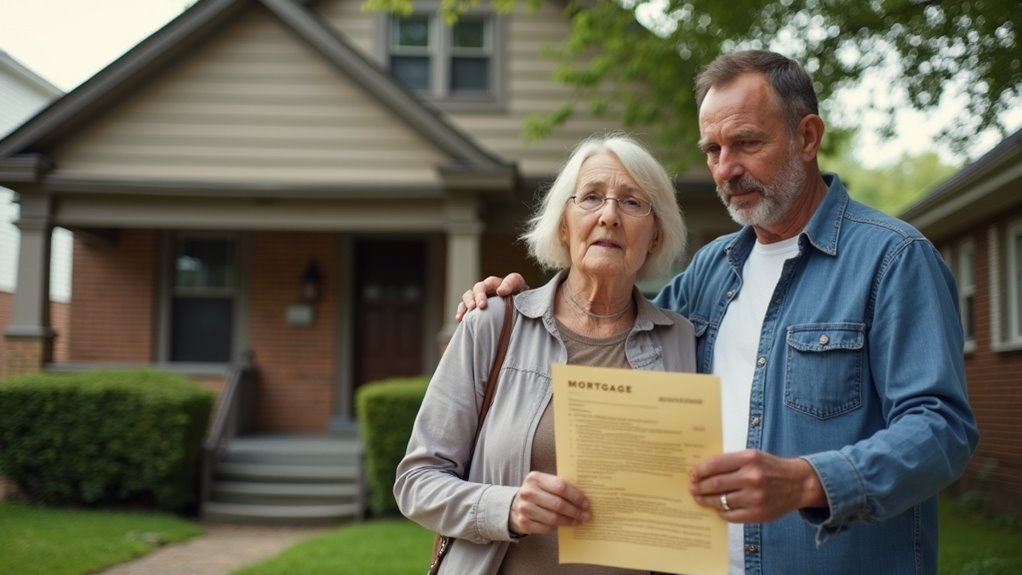Selling a House With an Outdated Mortgage in Cincinnati




Selling your house in Cincinnati with an outdated mortgage can be confusing. Many homeowners worry about what happens to their old loan. If you do not know your options, you could lose money or face delays.
The process can feel overwhelming. Outdated mortgages may have hidden fees or strict rules that make it harder to sell. You might not be sure if buyers will even want your home.
You can sell a house with an outdated mortgage in Cincinnati by understanding your loan and preparing the right documents. You should check for penalties and get expert advice before selling.
This can help you avoid mistakes and get the most money from your sale. This blog will guide you through each step and make selling your home with an outdated mortgage easier.
Table of Contents
Understanding Outdated Mortgages and Their Impact on Home Sales

An outdated mortgage can affect how easily you sell your home in Cincinnati. If your mortgage has higher interest rates than current ones, buyers may worry about costs. They might see the home as less affordable, even with a good sale price.
Property taxes in Cincinnati are recalculated when a home is sold. If buyers think the mortgage terms are less favorable, they may hesitate to buy. You should check if your mortgage interest rate is higher than what buyers expect.
If your mortgage terms are not competitive, fewer buyers may show interest. Understanding your mortgage details can help you plan a better sale. If you know how your mortgage compares to current rates, you can address buyer concerns early.
How to Navigate Selling a House with an Outdated Mortgage
When you’re selling a house with an outdated mortgage, you need to assess what makes your loan terms outdated and identify potential obstacles, such as high interest rates or restrictive clauses. It’s essential to calculate your current mortgage payoff amount, understand any prepayment penalties, and investigate solutions if your mortgage terms are less favorable than today’s market. By taking these steps, you’ll be better equipped to make informed decisions and maximize your sale outcome in Cincinnati.
What Makes a Mortgage Outdated?
A mortgage becomes outdated when its terms no longer match current loan options or rules. This can happen if it has a high interest rate, a balloon payment, or old restrictions. Outdated mortgages may not offer benefits that new loans provide.
Some old mortgages include prepayment penalties or do not allow for easy home upgrades. Many modern loans now include more flexible features for borrowers. If your loan is outdated, you might miss out on these advantages.
Outdated mortgages might also not have an escrow account for taxes or insurance. This can make selling or managing the home harder. If you plan to sell, check if other homes nearby have newer, more attractive loans.
Knowing if your mortgage is outdated can help you avoid surprises when selling your Cincinnati home. You may need to update your loan or offer incentives to buyers. Understanding these issues early can make the selling process smoother.
Common Challenges with Old Mortgage Terms
Selling a house with an old mortgage in Cincinnati can be challenging. Older mortgage terms often have higher interest rates than current loans. This can make your home less appealing to buyers.
You may have paid more interest than principal, especially in the early years. If this is the case, you might have less home equity than you hoped. Less equity can make it hard to set a competitive price or pay closing costs.
Many old mortgages do not allow early payoff or easy transfer to new owners. If your mortgage is inflexible, it may complicate negotiations with buyers. Knowing these issues can help you plan for a smoother sale.
How to Calculate Your Current Mortgage Position
Understanding Prepayment Penalties
Options for Dealing with High-Interest Rates
To calculate your current mortgage position, first check your latest mortgage statement. Find the remaining loan balance listed there. This is the amount you still owe.
You should also look at your original and current interest rates. Outdated mortgages often have higher rates than today’s rates. This affects your monthly payments and total loan payoff.
If your credit score has improved, you might qualify for better loan terms. Consider refinancing before selling if it saves you money. Only refinance if the savings outweigh the costs.
Estimate your home’s market value by comparing it to similar homes nearby. Subtract your mortgage balance from this value to find your equity. This equity is important when negotiating or considering cash offers.
Prepayment penalties are fees charged for paying off your mortgage early. Some loans, especially older ones, may include these penalties. These fees can lower the money you get from selling your home.
Lenders use prepayment penalties to recover lost interest. The penalty might be a percentage of your remaining balance or several months of interest. You should always check your loan documents for these details.
If you cannot find the information, contact your lender directly. Understanding these penalties will help you plan your home sale better. If you know about any penalties, you can avoid surprises during the selling process.
When you have a home with a high-interest mortgage, it is important to know your options. High-interest rates can lower your profits and add stress during a sale. You should take steps to protect your finances.
Start by checking your loan terms to see if you can refinance before selling. Refinancing may lower your monthly payments and help you keep more money at closing. If you cannot refinance, adjust your sale price to reflect the higher payoff amount.
You could also consider selling to a cash home buyer in Cincinnati, such as Prestige Investments Cincinnati. Cash buyers often close quickly and buy homes in as-is condition. This can save you time and reduce your financial worries if your mortgage rate is high.
Legal Requirements and Documentation
To sell a house with an outdated mortgage in Cincinnati, you’ll need to prepare specific paperwork, including your original loan documents and payoff statement. You must also address title search and insurance requirements, and ensure the mortgage release process is handled correctly. Working closely with your lender is essential to confirm all legal obligations are met and the transaction closes smoothly.
If you want to sell your house in Cincinnati and still have a mortgage, you need certain documents. These papers make the sale smooth and legal. Without them, you may face delays or problems. You must get a mortgage payoff statement from your lender. This paper shows how much you still owe and any fees for paying early. It also helps you figure out how much money you will get after the sale.
You should collect your original loan documents and recent mortgage statements. Lenders and buyers may ask for these to check your payment history. Changes in your credit score or interest rates could impact the sale. Sellers must also show a government-issued photo ID, the property deed, and a signed purchase agreement. These documents prove your identity and ownership. If you gather these ahead of time, the process will be faster and easier.
Title Search and Insurance Considerations
Mortgage Release Process
Working with Your Current Lender
Before you sell a house with a mortgage in Cincinnati, you must handle title search and insurance. A title search checks if you own the property and if there are any hidden claims. If you skip this, you could face legal problems or delays.
Title insurance is also important for both the seller and buyer. This insurance protects against issues that might appear after the sale. If problems with the title come up later, title insurance helps cover financial losses.
These steps help make the sale go smoothly. They also help you meet your legal duties when selling your home. If you complete them, you lower the risk of trouble for everyone involved.
The mortgage release process ensures your old mortgage is cleared before closing. Your lender must provide a release document showing the loan is paid off. This document removes the lender’s claim on your property.
You will need your original loan paperwork, recent statements, and proof of payoff. These records protect everyone involved in the sale. Accurate documents help avoid delays.
If you live in Cincinnati, the county records the mortgage release. This step makes your property title clear. Always confirm all legal steps are complete before moving forward.
When selling a house with an old mortgage in Cincinnati, you must work closely with your lender. This helps you follow the law and collect the right documents. If you miss a step, your sale could be delayed.
Request a payoff statement from your lender to know the exact amount you still owe. You should also check your loan terms for any special rules about selling. Some older loans may require you to tell the lender before listing your home.
Gather all your original mortgage contracts and payment records before you contact the lender. Accurate paperwork can prevent legal trouble. If you need help, ask your lender what documents they need.
Financial Implications of Selling with an Outdated Mortgage

When you’re selling a house with an outdated mortgage, you need to carefully calculate your break-even point and factor in all closing costs to understand your true net proceeds. It’s essential to account for potential tax obligations and prepare for scenarios like negative equity, where your mortgage balance exceeds your sale price. Assessing these financial details upfront protects you from unexpected losses and helps you make informed decisions.
How to Calculate Your Break-Even Point
To find your break-even point, compare your mortgage payoff with your expected home sale price. This helps you know if selling your house will cover your loan. If the sale price is higher, you may make a profit.
Start by getting your current mortgage payoff amount. This includes your remaining loan balance, any interest owed, and possible fees. Ask your lender for an updated payoff statement if you are unsure.
Next, subtract your mortgage payoff from the price you expect to get for your house. The result shows if you will break even or have money left. Use the table below to organize your figures:
| Factor | Example Amount | Your Amount |
|---|---|---|
| Mortgage Payoff Balance | $150,000 | |
| Expected Sale Price | $180,000 | |
| Break-Even Calculation | $30,000 |
If your calculation is positive, you will have money after selling. If it is negative, you may owe money at closing. Knowing this helps you make better decisions about selling your home.
Understanding Closing Costs and Net Proceeds
Closing costs are fees you must pay when you sell your home. These costs reduce the amount of money you get after the sale. Calculating your net proceeds helps you know your final payout.
If you sell a house in Cincinnati with an old mortgage, you need to watch every expense. Closing costs are usually between 6% and 10% of your sale price. These costs can lower your home equity.
Common closing costs include agent commissions, title insurance, and transfer taxes. You may also have to pay off your mortgage and any prepayment penalties. Seller’s attorney fees, escrow fees, and repair costs are other possible expenses.
If you subtract all these costs from your sale price, you get your net proceeds. Knowing each expense helps you avoid surprises at closing. Staying informed protects the money you have built in your home.
Tax Implications to Consider
Selling a house with an outdated mortgage in Cincinnati can affect your taxes. You may owe capital gains tax if you make a profit. The tax amount depends on how long you owned the home.
Your old mortgage’s high interest rate might have changed your deductible interest. This could affect the taxes you pay when you sell. Always check your original mortgage documents.
You must pay property taxes up to the closing day. The final amount may be adjusted and can change your net proceeds. If you have claimed mortgage interest or property tax before, talk to a tax expert.
A tax professional can help you follow current tax rules. This advice helps you avoid surprises. Careful planning gives you the best financial result from the sale.
Dealing with Negative Equity
Selling your home with negative equity means you owe more than your house is worth. This situation makes selling more difficult. You need to consider your options carefully.
If your loan balance is higher due to interest rate changes, check if refinancing is possible. You could ask your lender about a short sale. The lender may agree to accept less than you owe.
Loan modification might help if you need better payment terms. Bringing cash to closing could cover the gap if you have savings. Renting your home is another choice while waiting for market recovery.
Some homeowners sell quickly to cash buyers like Prestige Investments Cincinnati. This can help avoid ongoing mortgage payments. Careful planning can reduce your losses and protect your finances.
Alternative Solutions for Homeowners
If you’re struggling with an outdated mortgage, you have several strategic options to consider. You might investigate mortgage refinancing, loan modification programs, short sale arrangements, or even a deed in lieu of foreclosure, each with specific eligibility requirements and financial impacts. Understanding these alternatives can help you make an informed decision and protect your financial interests.
Mortgage Refinancing Options
Mortgage refinancing offers different options if you have an old mortgage. It can help you get better loan terms or lower rates. This makes selling your house easier if your current mortgage is less attractive.
Refinancing can lower your monthly payments if you qualify for a lower interest rate. You can switch from an adjustable-rate to a fixed-rate mortgage for more stability. Shortening your loan term could help you build equity faster.
Homeowners may use cash-out refinancing to access home equity. This money can fund home repairs or pay off other debts. If you improve your home, buyers might find it more appealing.
Some buyers may qualify to assume your loan. In this case, the mortgage transfers to them, making the sale smoother. You should ask your lender if loan assumption is an option.
Loan Modification Programs
Loan modification programs offer ways for Cincinnati homeowners to change their mortgage terms. These options help if your current loan makes selling your home hard. You can explore them if your mortgage payments are high or you do not have enough equity.
A loan modification might lower your interest rate or extend your repayment time. Some programs may even reduce the amount you owe. Lenders review your financial situation before deciding if you qualify.
You must show proof of income, details about your mortgage, and documents about your hardship. If you need help, contact your lender to ask about available programs. Loan modification can help you avoid falling behind and make selling possible in the future.
Short Sale Possibilities
A short sale is possible if you cannot keep up with your mortgage in Cincinnati. This option lets you sell your home for less than you owe, but only with your lender’s approval. Homeowners might consider a short sale if loan modification does not help enough.
Lenders will review your financial hardship and the home’s market value before approving a short sale. You must provide documents showing you can’t afford the current mortgage. If the lender agrees, this process can help you avoid the serious credit damage caused by foreclosure.
Negotiations may be needed to settle the remaining mortgage balance. If successful, a short sale can give you a fresh financial start. Always check your lender’s requirements before starting a short sale.
Deed in Lieu of Foreclosure
A deed in lieu of foreclosure lets you give your home back to your lender if you cannot pay your mortgage. This option can help you avoid the full foreclosure process. It may be available if selling your home or refinancing is not possible.
The lender usually asks for a home appraisal before agreeing to this option. If the lender accepts, you will transfer the property’s ownership to them. This step may reduce harm to your credit compared to a foreclosure.
A deed in lieu will still affect your credit score, but usually less than a foreclosure. If you are considering this option, you should talk to your lender first. Always seek legal advice to understand your specific situation and requirements.
Submit Your Information Below For A Cash Offer On Your Property
Steps to Successfully Sell Your House
To sell your house with an outdated mortgage, you’ll need to start with a professional property valuation to set a solid foundation. Next, calculate your exact mortgage payoff amount and develop a pricing strategy that attracts buyers while covering your obligations. Finally, use targeted marketing to highlight your property’s strengths and reach serious buyers quickly.
Getting a Professional Property Valuation
A professional property valuation gives you an accurate idea of your home’s worth. If you want to sell a house with an outdated mortgage in Cincinnati, you should start here. An expert uses market data and local trends to set a fair price.
A certified appraiser or real estate agent offers an unbiased opinion. Their report considers your home’s features and recent sales nearby. If you rely only on your own estimate, you might miss key details.
A professional can point out which upgrades add value to your home. You may also get advice on simple changes like home staging. If you follow these suggestions, your house will likely attract more buyers.
A proper valuation helps you avoid pricing mistakes. If you set the wrong price, your sale could be delayed. With expert guidance, you can market your home more effectively.
Determining Your Mortgage Payoff Amount
To find your exact mortgage payoff amount, contact your lender directly. Ask for a formal payoff statement with all remaining principal, interest, and any fees. Do not use your latest mortgage statement because it may not include accrued interest or penalties.
If you have refinanced or have an old loan, double-check the payoff number. Compare this figure with your home’s value to see your equity. This comparison shows how much money you will get after paying off your mortgage.
Knowing the correct payoff amount helps you avoid surprises at closing. Accurate information makes the sale process smoother. Always check these figures before making decisions about selling your home.
Pricing Strategy for Quick Sale
To sell your house quickly in Cincinnati, you need to price it correctly from the start. The right price attracts buyers and helps avoid delays. A detailed look at local sales is essential.
You should check recent sales in your neighborhood and compare similar homes. If other listings are dropping prices, consider doing the same. Always factor in your home’s age, condition, and any updates.
Staging your home can help it look its best to buyers. Well-staged homes often sell faster and for better prices. If buyers give feedback, use it to adjust your price. Review market trends regularly to keep your price competitive. Make changes if the market shifts. Careful pricing increases your chances for a fast sale.
Marketing Your Property Effectively
To make your property stand out in Cincinnati’s real estate market, focus on key updates and presentation. Modernize kitchens and bathrooms with neutral colors and new fixtures. Staging each room can help buyers see the home’s best features.
If you remove clutter, rooms will look larger and more inviting. Landscaping improvements, such as fresh mulch and trimmed hedges, increase curb appeal. Seasonal flowers can make the entrance more attractive.
Professional photos will highlight your home’s updates and attract online attention. Listings with quality images get more interest from buyers. Use social media and real estate websites to reach a wider audience. If you combine smart design with curb appeal, your home will attract more buyers. Faster sales and better offers often follow these simple changes.
Markets We Buy Houses In
Why Choose a Cash Home Buyer? Prestige Investments Cincinnati Can Help
Choosing a cash home buyer like Prestige Investments Cincinnati makes selling your house faster and easier. You avoid long negotiations, delays, and repair costs. Prestige Investments Cincinnati buys homes in any condition, so you do not need to fix anything.
If your mortgage is outdated or your property needs work, their team can help. They give immediate cash offers without waiting for bank approval. This means you can sell quickly and move on.
Prestige Investments Cincinnati knows the local market and offers fair prices. They handle all the paperwork and legal steps for you. If you want a simple and stress-free sale, this option is a good choice.
Selling a House With an Outdated Mortgage in Cincinnati: Frequently Asked Questions
Is it possible to sell your mortgage?
You can’t normally sell your mortgage to someone else. Most loans (especially conventional ones) must be paid off if you sell or transfer the home. Only certain government-backed loans (FHA, VA, USDA) may allow assumption by another person.
Can you transfer a mortgage to another person?
You may transfer your mortgage only if it’s an assumable mortgage, typically a government-backed loan like FHA, VA, or USDA. The other person must meet lender approval and take over the same terms and payments.
What does it mean when your mortgage is transferred?
Mortgage transfer (or assumption) means someone else takes over your loan. They pay the same balance, interest rate, and term. You must get lender approval. The loan terms stay the same; only the borrower changes.
What does it mean to transfer your mortgage?
To transfer your mortgage means letting another person become legally responsible for repaying it. They must qualify with the lender. This is only possible if your loan is officially assumable, otherwise you must refinance or pay it off.
Can I add someone to my mortgage?
Yes, you can add a co-borrower (co-mortgagor) if the lender approves and they qualify. Both will share legal responsibility for the loan and ownership of the home—but adding them doesn’t remove you from the mortgage unless you refinance.
How long do mortgage transfers take?
If your mortgage is assumable and approved, the process takes about 45 to 90 days. Lender underwriting, paperwork, and closing steps slow it down—longer than a standard refinance or new mortgage.

